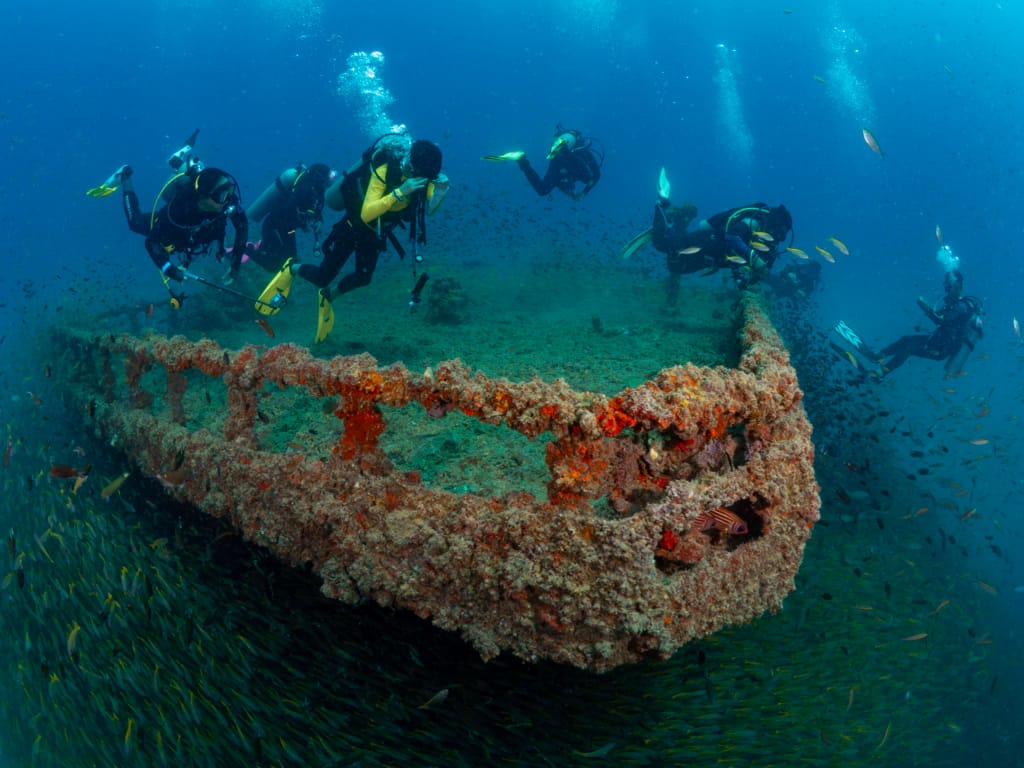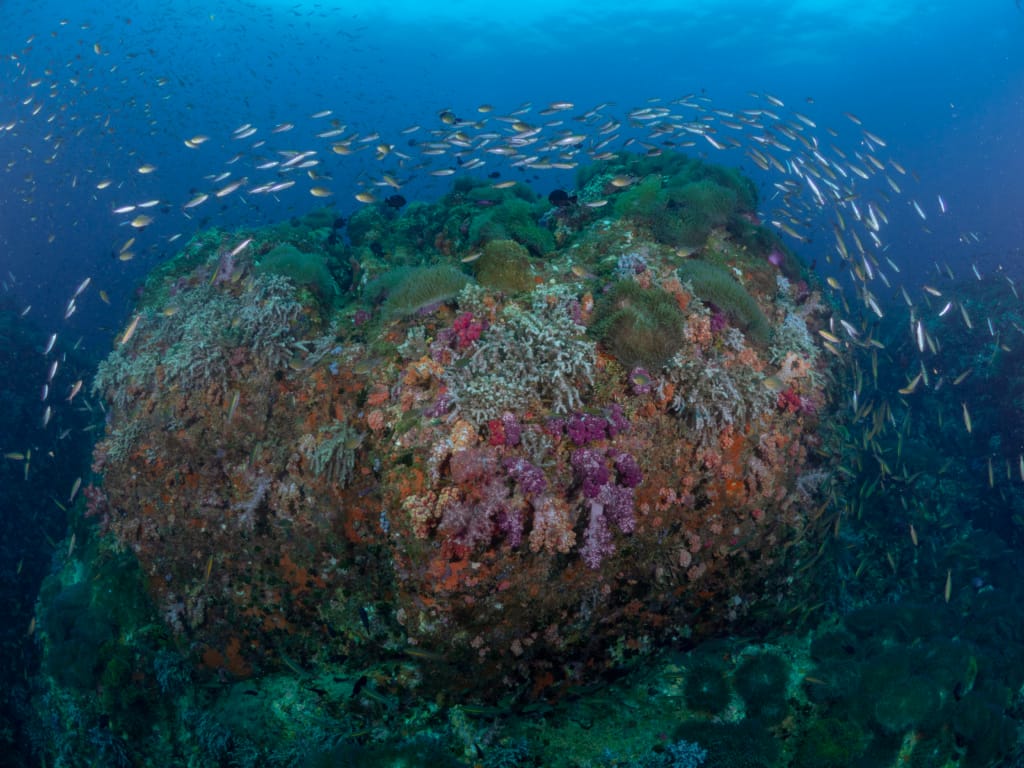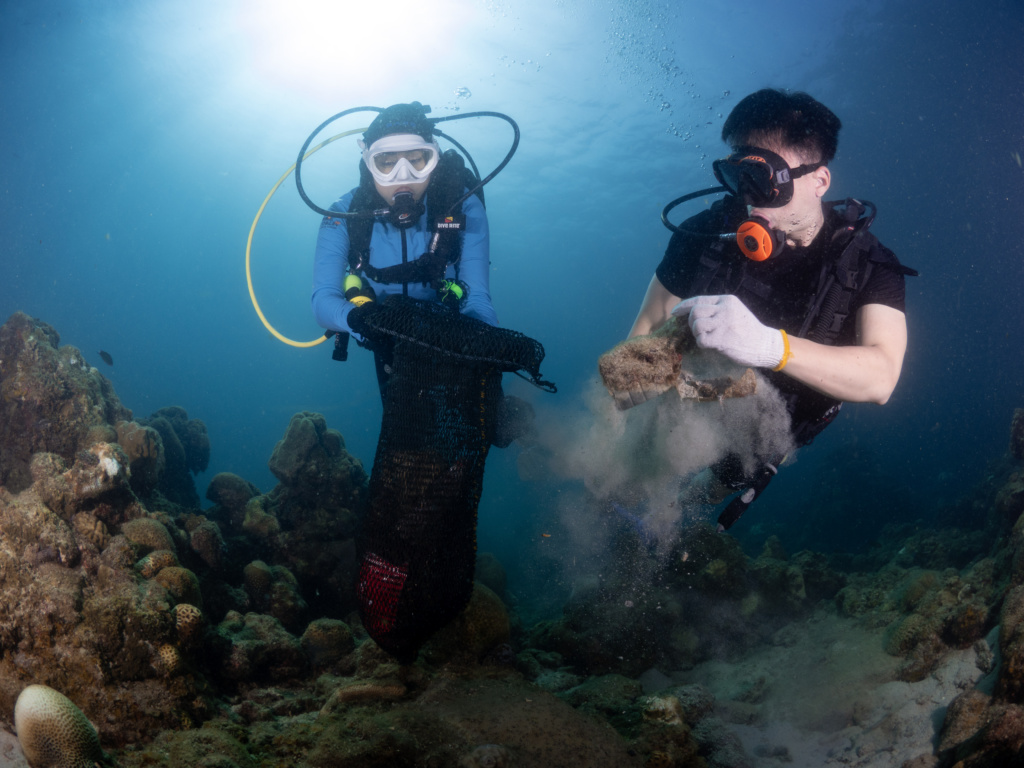By Dr. Kalsitinoor Set
Dr Kalsitinoor, a senior lecturer at Universiti Malaysia Terengganu, explores how the scuba diving industry contributes to conservation, and provides recommendations for long-term environmental and socio-economic sustainability.
Malaysia, with its pristine waters and vibrant marine biodiversity, stands out as a global hotspot for scuba diving enthusiasts. Malaysia has 50 islands gazetted as marine parks: 42 in Peninsular Malaysia, six in Sabah, and two in Sarawak. Islands such as Redang in Terengganu, Tioman in Pahang, and Sipadan in Sabah are renowned for their rich marine biodiversity and have been promoted as top diving destinations.
These islands attract thousands of divers annually, significantly contributing to Malaysia’s tourism revenue; and scuba diving is promoted as a niche product by the Ministry of Tourism, Arts and Culture. The growth of the scuba diving industry has led to the establishment of many scuba diving operators and professionals—including dive guides—to cater to the increasing demand in the country.
However, the increasing popularity of scuba diving raises concerns about its impact on fragile marine ecosystems. Sustainable tourism practices in the scuba diving industry are vital for preserving Malaysia’s underwater treasures for future generations whilst supporting local communities.

Saudagar Wreck, Pulau Bidong, Terengganu. Photo by Ismadi Ismail, Raja Laut.
The Environmental Impact of Scuba Diving
Malaysia’s coral reefs, mangroves and seagrass beds are not just habitats for marine species, including turtles, sharks, and colourful nudibranchs. They are vibrant, living ecosystems—the main attraction for scuba divers, and a testament to the beauty and wonder of nature. However, they are also highly sensitive to disturbances. Unregulated diving practices can lead to coral breakage, marine pollution, and behavioural changes in wildlife, threatening the health and longevity of this natural wonder.
Scuba diving operators’ roles, through dive guides, are pivotal in mitigating environmental impacts. Dive guides not only ensure that divers adhere to marine park regulations but also play a crucial role in educating divers on proper underwater behaviour and the importance of conservation. They serve as ambassadors of the marine environment, enlightening divers on the delicate balance of these ecosystems and the need for responsible diving practices.
In addition to diver-related impacts, external threats like climate change, overfishing and coastal development further jeopardise these habitats. Without concerted effort to minimise harm, the delicate balance of these ecosystems could be irreparably damaged, affecting marine life and the livelihoods of local communities reliant on diving tourism.

Brolok, Pulau Tenggol, Terengganu. Photo by Ismadi Ismail, Raja Laut.
Sustainable Practices in Malaysia’s Scuba Diving Industry
1. Regulations and guidelines
Malaysia has established marine parks and dive site zoning to protect vulnerable areas. Seasonal closures, for example at Sipadan Island, prevent impacts from overtourism and allow marine ecosystems to recover. These measures ensure that diving activities are conducted responsibly.
2. Marine Conservation Initiatives
Efforts like coral restoration projects, marine life monitoring and underwater clean-ups are crucial for conservation. Dive operators across Malaysia have actively participated in marine conservation projects to mitigate the environmental impact of diving tourism. Collaboration with NGOs, local authorities, and educational institutions enhance conservation efforts by involving divers in the projects. One example is the coral restoration programme in Redang and Kapas Island in Terengganu—a marine conservation initiative that unites key stakeholders including local dive operators, Reef Check Malaysia (RCM), the Terengganu state government, Universiti Malaysia Terengganu and the Department of Fisheries (DOF).
3. Eco-friendly Dive Operations
Many dive operators in Malaysia have adopted sustainable practices, including eco-briefings and reducing single-use plastics in their operations. Dive guides also play a significant role in educating divers about the importance of marine life and emphasising diving ethics during dive briefings. Some dive operators in Malaysia have taken proactive steps to promote sustainable dive tourism by aligning with environmental best practices, such as obtaining Green Fin certifications.
4. The Role of Dive Guides in Sustainability
A Unique Role in Tourism
Dive guides are at the forefront of sustainable tourism. As the ‘third guide’ —alongside city and nature guides—dive guides play dual roles as educators and advocates for marine conservation. They ensure divers adhere to responsible practices such as avoiding coral contact and respecting marine wildlife.
Through engaging dive briefing and eco-awareness programmes, dive guides cultivate environmental stewardship among divers, turning recreational experiences into opportunities for education and advocacy.
Cultural and Community Engagement
Beyond marine conservation, dive guides act as cultural intermediaries, connecting divers with local traditions and stories. They share insights into local dialects and the stories behind the names and meaning of dive sites, fostering an appreciation for Malaysia’s rich cultural heritage while enhancing the diving experience.
Service Excellence in Sustainable Tourism
The integration of hospitality and environmental ethics positions dive guides as key players in delivering sustainable and high-quality diving experiences. By mastering customer service skills and promoting eco-friendly practices, dive guides help to differentiate Malaysia’s diving industry in a competitive regional diving market.
Their expertise in marine biodiversity, diving techniques, and environmental conservation makes them indispensable to Malaysia’s niche tourism products, and their dedication is worthy of our respect and appreciation.

Lost World Dive Site, Pulau Tenggol, Terengganu. Photo by Ismadi Ismail, Raja Laut.
Recommendations for Advancing Sustainability in Scuba Diving in Malaysia
For Dive Operators
Dive operators play a pivotal role in sustainable tourism by actively promoting eco-certifications and expanding partnerships with conservation organizations. They should also invest in training programmes for dive guides, focusing on sustainability practices and hospitality skills, to enhance service quality and align with global standards.
For Divers
Divers can contribute to sustainable tourism by choosing to support eco-friendly dive operators and strictly adhering to sustainable diving guidelines. Additionally, they are encouraged to participate in conservation initiatives such as underwater clean-ups, to actively protect and preserve marine ecosystems.
For Policymakers
Malaysian authorities can also encourage eco-friendly practices by organising annual underwater competitions that highlight and celebrate marine conservation efforts. These events could include activities such as underwater photography focused on marine biodiversity or clean-up drives to engage divers and operators in a fun and impactful way. Additionally, instituting awards for dive operators that excel in eco-friendly services would create healthy competition within the industry and motivate others to adopt sustainable practices.

Long Beach, Perhentian Island, Terengganu. Photo by Ismadi Ismail, Raja Laut.
Malaysia’s scuba diving industry is not only crucial in promoting sustainable tourism by preserving marine ecosystems but also in supporting local communities through economic benefits. The industry can protect the nation’s underwater attractions by implementing eco-friendly practices, fostering conservation initiatives, and encouraging responsible tourism while enhancing its global reputation. Tourism authorities must recognize the role of dive guides as the backbone of the scuba diving industry. They are essential for implementing responsible diving practices and enhancing the overall tourist experience.
Let us work together—divers, operators, and policymakers—to ensure that Malaysia can solidify its reputation as a global leader in eco-friendly diving tourism, ensuring that its underwater treasures remain vibrant for generations to come. Many organisations actively support sustainable tourism efforts.
Find out more:
Consider joining volunteer programmes at local universities like Sea Turtle Research Unit (SEATRU) under Universiti Malaysia Terengganu (UMT), or collaborating with local dive operators and NGOs such as Reef Check Malaysia (RCM) that often welcome volunteers to participate in marine conservation initiatives.
Acknowledgements
This article is supported by the Malaysian Ministry of Higher Education through the research programme Fundamental Research Grant Schemes (FRGS/1/2022/SS01/UMT/02/12).

